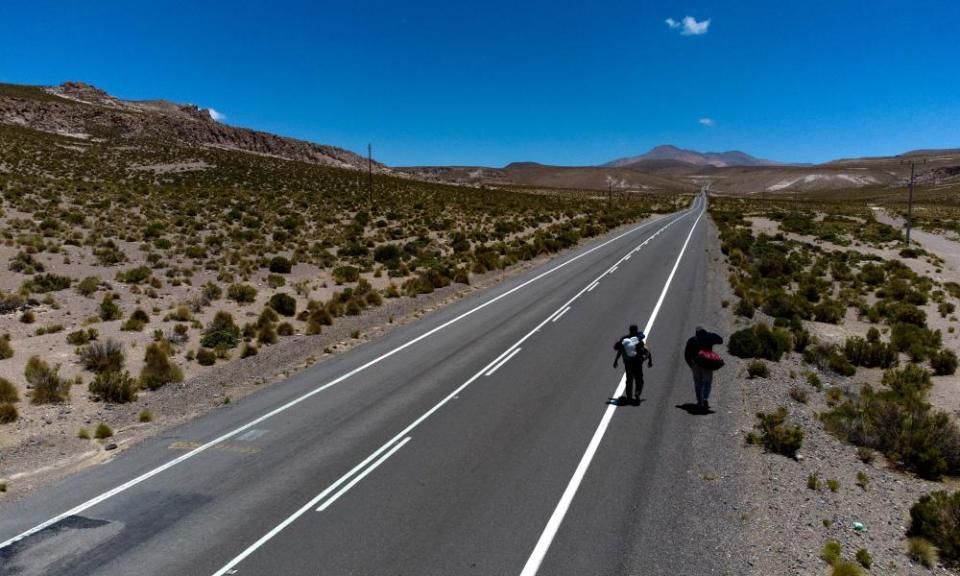Humanitarian crisis looms on Chile-Bolivia border as migrants cross on foot

Activists are warning of a looming humanitarian crisis on the border between Chile and Bolivia as growing numbers of migrants brave the harsh terrain of the Chilean altiplano to cross the frontier on foot.
Chile closed its land borders last year as a preventive measure during the Covid-19 pandemic, but authorities have reported a surge in irregular crossings, mostly caused by Venezuelan migrants fleeing economic instability and political turmoil in their home country.
Since the start of the year, up to 200 migrants have entered Chile each day, crossing an arid landscape 3,690 meters above sea level where temperatures can sink to -8C.
Local authorities have struggled to accommodate the migrants. In the border town of Colchane – which has intermittent electricity, no supermarkets or pharmacies, and sits three hours from the closest city – travelers have been forced to shelter under plastic tarps.
In February, two people – a Venezuelan and a Colombian – died in the town’s makeshift camp, reportedly a result of hypothermia, and one woman suffered a miscarriage.
“The town is not well equipped and has collapsed with the irregular arrival of so many people,” said Marcela Tapia, director of the International Studies Institute at Arturo Prat University in Iquique, who researches migration in the border area.
The Colchane mayor, Javier García, described the situation as “one of the worst humanitarian crises” after 1,600 people entered the town over a single weekend in late January.
Amnesty International and Chile’s National Institute of Human Rights accuse authorities of refusing to open public spaces such as gyms and town halls to accommodate the surge of migrants.
Police in the Tarapacá region, where Colchane is situated, reported 2,031 registered cases of undocumented entry in January – 32 times higher than the year before. The increase is attributed to the ongoing crisis in Venezuela, which has prompted more than 5 million people to leave the country in recent years.
Chile has received at least 470,00 Venezuelan migrants and refugees – the third largest group after Colombia and Peru. According to the National Institute of Statistics, Chile’s foreign population has risen by 19.4% in two years alone.
The Chilean government has deployed the military to patrol the border and coordinated planes to send migrants home. In February, the government mounted a high-profile deportation event, expelling 86 people on a military plane to Caracas, and another 52 migrants by bus.
Chile’s air force tweeted pictures of the deportation, which showed migrants dressed head-to-toe in white sanitary protective gear, each escorted by a police officer. The move was criticized by activists who accused the government of treating migrants as criminals and trampling on their right to claim asylum.
“This is a profound humanitarian crisis that has been criminalized by the government,” said Vanessa González of the National Migrant Assembly in Chile. “We need to create a humanitarian plan that includes the rights of these people, rather than frame immigration as a problem.”

Meanwhile, the government’s health department has moved groups camping in Colchane into state-run facilities to undergo a 14-day quarantine.
Such quarantine is a mandatory precaution for anyone entering Chile during the pandemic, but undocumented migrants have been told they must report themselves for “illegal entry”, which can be used by courts to justify expulsion orders and reject requests for asylum.
“The Covid-19 sanitary measures have been used as an excuse to contain people to later expel them,” said González.
Activists say that the current surge is partially due to strict new immigration rules introduced by the government of President Sebastian Piñera, which strictly limited circumstances in which Venezuelans can obtain visas and legally enter the country.
Despite the well-documented state violence and repression in Venezuela, Chile has recognized only 17 Venezuelans as refugees since 2010, far behind the total number of Venezuelan refugees in Peru (1,282), Ecuador (374), and Brazil (46,343). Colombia, meanwhile, recently granted legal status to an estimated 1 million undocumented Venezuelan migrants for a duration of 10 years.
Since the militarization of the Colchane border, migrants are switching routes to cross into Chile via Ollagüe, another small altiplano town 300km to the south.
Romina Ramos, director of the Border Criminological Studies Center at the Arturo Prat University, said the border control at Colchane had only caused a “balloon effect”, and is forcing migrants to take even more dangerous routes.
“People are going to keep trying to find a way to enter, and with each new barrier they will be even further exposed to dangerous situations.”

 Yahoo Movies
Yahoo Movies 